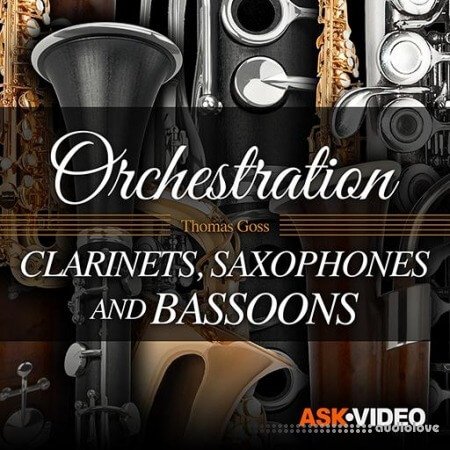Ask Video Orchestration 104 Clarinets, Saxophones and Bassoons [TUTORiAL]

FANTASTiC | 08 March 2019 | 1.52 GB
This orchestral wind course takes an in-depth look at the individual members of the clarinet, bassoon and saxophone families. Continue your studies of the wind section with professional orchestrator and instructor Thomas Goss!
Now that you’ve mastered the upper winds in the Orchestration 103 course, it’s time to move to the clarinets, bassoons and saxophones. This course will teach you everything an orchestrator needs to know about these instruments, including their range, technique, and the role they play in the orchestra.
The course begins with a complete look at the clarinet family, including the A and B-flat clarinets, the bass clarinet, the E-flat clarinet, the bass horn and the contrabass clarinet. Next, Thomas takes a detailed look at an occasional (but very significant) addition to the wind section: the saxophones. You learn about the history and characteristics of the soprano, alto, tenor and baritone saxophones, and you discover how they differ from other wind instruments.
In the next section, Thomas covers every member of the lowest standard woodwind family, the bassoon and contrabassoon. You will learn why the bassoon is much more than just a bass instrument for the wind section. The course closes with essential tips to help you with your orchestration studies.
So join composer and orchestrator Thomas Goss in this course, and discover the fascinating world of the clarinet, bassoon and saxophone instruments!
home page
Now that you’ve mastered the upper winds in the Orchestration 103 course, it’s time to move to the clarinets, bassoons and saxophones. This course will teach you everything an orchestrator needs to know about these instruments, including their range, technique, and the role they play in the orchestra.
The course begins with a complete look at the clarinet family, including the A and B-flat clarinets, the bass clarinet, the E-flat clarinet, the bass horn and the contrabass clarinet. Next, Thomas takes a detailed look at an occasional (but very significant) addition to the wind section: the saxophones. You learn about the history and characteristics of the soprano, alto, tenor and baritone saxophones, and you discover how they differ from other wind instruments.
In the next section, Thomas covers every member of the lowest standard woodwind family, the bassoon and contrabassoon. You will learn why the bassoon is much more than just a bass instrument for the wind section. The course closes with essential tips to help you with your orchestration studies.
So join composer and orchestrator Thomas Goss in this course, and discover the fascinating world of the clarinet, bassoon and saxophone instruments!
home page
Only registered users can see Download Links. Please or login.


Comments